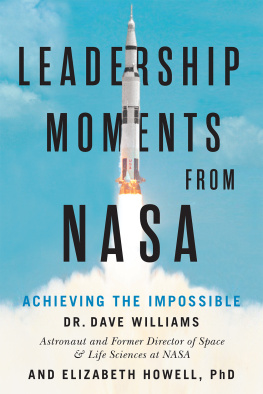ACKNOWLEDGMENTS
The creation of a volume of this sort necessarily incurs debts of gratitude that cannot fully be repaid. Nonetheless the editors wish to acknowledge, if not make full restitution for, our many obligations.
First and foremost we thank our contributors. This volume grew out of an enlightening intellectual exchange among the invitees to a small conference we convened to contemplate the nexus between leadership and the process of discovery in its many forms. Coming as they did from multiple and diverse academic disciplinesand all bringing with them the requisite spirit of inquiry, open-mindedness, and, yes, sense of humorthe participants interacted in ways that made the value of the conferenceand this volumeequal to more than the sum of its parts. The editors further acknowledge the good spirit and patience with which the contributors have endured the editors subsequent efforts to convert the conference papers into this final edited volume.
This work is the latest in a series of works published by Palgrave Macmillan under a series titled Jepson Studies in Leadership. We are deeply grateful to our editor at Palgrave, Laurie Harting, who has shown so much faith in us and our project. She has been supportive at every stage. Likewise our fellow series editor, Terry L. Price, has been a constant source of advice and encouragement.
This series, as well as this volume and the conference that inspired it, have been activities of the Jepson School of Leadership Studies at the University of Richmond. Our dean, Sandra J. Peart, has been unfailing in her vision for the Jepson School as the center for leadership scholarship and unstinting in her support. With respect to this volume, Nancy Nock of the Jepson School did all the laborious planning and administrative tasks related to our Leadership and Discovery colloquium. Tammy Tripp, the Jepson Schools coordinator of academic research and publications, performed all the detailed work necessary to bring this volume to fruition. This book simply could not have been completed without these individuals.
Less visible to the public eye but transcendently important to our work (and lives), our spouses undoubtedly are even happier than we are to see this book in print. We deeply appreciate them, and we promise (really!) to Marion and Suzanne that we will henceforth seek to better balance our allocations of time.
CHAPTER ONE
Discovery in Astronomy: Ex Uno Plures
K AREN B. K WITTER
The solitary figure fixes his eye to the telescope, scanning the skies. The sleeves of his robes drag across piled-up volumes as he pores over tattered charts and arcane instruments, seeking the discovery that will catapult him to immortality. This is the kind of image evoked over centuries by the word astronomer. Except for the candle, the tableau in Gerrit Dous Astronomer by Candlelight, painted 350 years ago, is probably not too far from the popular image, even today. For most of astronomical history, meticulously compiling catalogues of positions and motions in the sky was the primary research activity.
Among the earliest documented astronomical observations are Babylonian cuneiform tablets. Incised into one cuneiform tablet, a seventh century BCE copy of an original from about 1,000 years earlier, are more than twenty years worth of observations of the planet Venus. This tablet is just one illustration of the diligence and cleverness of ancient observers: the text shows a clear understanding that Venus appears in the sky as both a morning star and an evening star, and that in a period of eight years, the evening-morning-evening cycle occurs exactly five times.
Recorded on similar tablets spanning more than 600 years of regular sky watching are accounts of eclipses, observed and predicted positions of planets, and a description of what we now call Halleys Comet. This centuries-long effort has been called the longest research project ever.
Advances in astronomical knowledge came from studying and extending these observation records and from discovering changes, errors, or improvements. Ptolemy, Copernicus, Kepler, and Newton all relied on such stores of accumulated data to test their theories of motion in the heavens. Not until the nineteenth century did the activities of the astronomer deviate substantially from those of earlier practitioners.
Over the centuries, discovery in astronomy had been mainly a solitary endeavor. Whether supported by a personal fortune or a benevolent patron, an astronomer generally worked alone. This tendency was compounded by the slow speed of communication. Scientists might write to each other about their work, but the rate of information transfer was excruciatingly low. Add to that the intermittent roiling of Europes political landscape over the last half dozen centuries, making travel more than a little dicey, and it is easy to see why astronomys pantheon consisted of individual names.
The work of a modern astronomer would be largely impenetrable to her predecessors, from Babylonia to the Holy Roman Empire. Advances in physics and chemistry in the nineteenth and early twentieth centuries transformed astronomy into astrophysics (its modern synonym), and a generally individual pursuit into a team enterprise. The increasing complexity of modern astrophysical problems and the challenge of obtaining the necessary scientific and financial resources have exerted evolutionary pressure favoring collaboration over individual work. The difference is not just one of technology, but of approach and execution, wrought by the current research environment as well as by the kinds of questions being asked.
Categorizing Astronomical Leadership
Leadership in astronomical discovery comes in several frequently overlapping forms. In addition to obviously prized traits like innovation and insight, the group nature and the cost of contemporary research have come to require new, equally valuable talents. Examination of the leadership in successful research programs in astronomy (or other scientific disciplines) consistently reveals one or more of these factors at work. I propose three archetypes of leadership that are embodied in the examples that follow.
Type A: synthesisa novel idea or way of looking at an issue.
Type B: methoda tool (hardware or software) that allows an unprecedented look at the universe.
Type C: exhortationcharismatic and compelling articulation of a scientific goal.
Notice that Ive said nothing about the scientific method (hypothesis, experiment, reevaluation) that many of us were taught as the modus operandi of modern science. Of course, the formal scientific method is one of the tools at an astronomers disposal, but as we will soon see, important science can be done in many ways, including some that bypass not only its letter, but also its spirit.
Type A
Type A discovery can occur as described in Malcolm Gladwells book, Blink: a sudden insight that places the problem into a completely new perspective. Objective facts and subjective processing converge. The discoverer may not even be able to pinpoint the source of the breakthrough, or explain why a certain step was taken. Maddeningly, it sometimes even happens that the solution has been in front of the discoverer, unrecognized until that singular instant.
Kepler
Johannes Kepler, the seventeenth century mathematician, discovered the laws of planetary motion. His accomplishments are all the more remarkable for the sheer quantity of mathematical calculation required and the lack of modern mathematical methods. Keplers achievements, if not quite out of thin air, were nonetheless sui generis: as has been said of Einstein, his discoveries would have been made by someone eventually, but not soon.








